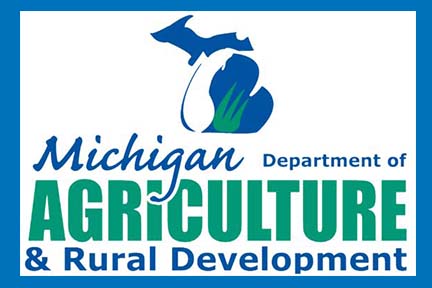
MDARD Announces Grant Opportunity
|
|||
|

|
|||
|

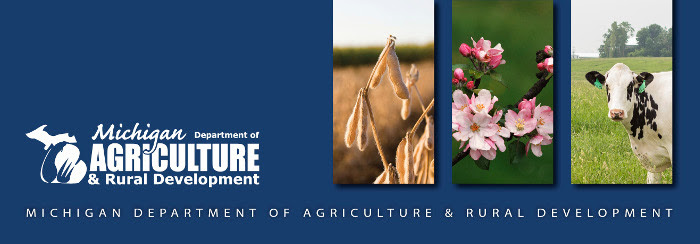 |
| For immediate release: October 10, 2024 Media contact: Jennifer Holton, 517-284-5724 Program contact: Tracey Barnes, 517-388-4540 MDARD Announces Grant Opportunity for Rural AreasProposals due by 5 p.m. (EST) on December 5, 2024 LANSING, Mich. – Michigan Department of Agriculture and Rural Development (MDARD) Director Tim Boring today announced the department is offering a competitive grant program to promote the sustainability of land-based industries and support infrastructure benefiting rural communities in Michigan. “Our rural communities are a fundamental part of Michigan’s food and agriculture industry. Governor Whitmer and I are committed to providing the support and resources to help increase resiliency and success in those communities,” said Boring. “The Rural Development Grant prioritizes sustainability for land-based industries and provides the crucial infrastructure needed for our rural areas to grow and thrive for years to come.” The Rural Development Fund grants are available for projects addressing expansion and sustainability of land-based industries; worker training related to land-based industries; and energy, transportation, housing, communications, water, and wastewater infrastructure to benefit rural communities and micropolitan statistical areas. Land-based industries include food and agriculture, forestry, mining, oil and gas production, and tourism. Eligible counties include those with a population no greater than 70,000 residents or micropolitan statistical areas. For a complete list of eligible counties, visit www.michigan.gov/mdardgrants. The total amount of funding available during this grant cycle is $2 million. The maximum limit that can be requested for a project grant $100,000 with all proposals requiring a minimum 30 percent cash match of the grant amount being requested. Applicants for grant funds must describe how the project will impact and produce measurable outcomes for rural communities around land-based industries. The proposals will be evaluated through a competitive process. Those interested in applying for the grant program should visit www.michigan.gov/mdardgrants to view the program details. All applications must be submitted through the MiAgGrants system. All applicants are required to submit three letters of support. MDARD will host an informational webinar on this grant opportunity on Thursday, October 24, 2024, at 10 a.m. (EST). More information on the webinar is located on the website. Any additional communications concerning this Request for Proposal should be sent to [email protected]. Proposals must be received online through the MiAgGrants system no later than 5 p.m. (EST) on December 5, 2024. Proposals received after 5 p.m. (EST) will not be considered. The Rural Development Fund grants are funded by the Nonferrous Metallic Minerals Extraction Severance Tax. The Rural Development Fund was created under PA 411 of 2012. Revenue from the severance tax is in accordance with PA 410 of 2012. For more information on the MDARD Grants Program and how we can help you, visit www.michigan.gov/mdardgrants or email us at [email protected]. |
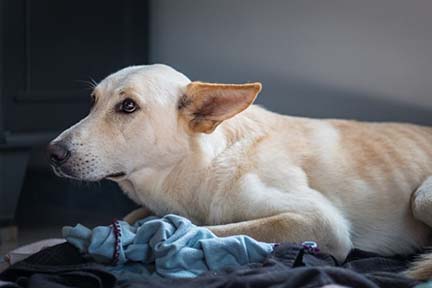
|

 |
| For immediate release: August 29, 2024
Media contact: Jennifer Holton, 517-284-5724 MDARD Encourages Owners to Help Keep Their Animals Safe this Labor Day HolidayKeep animals happy and healthy as they enjoy the last days of summer funLANSING, MI—As Michiganders prepare to celebrate the last days of summer, this Labor Day holiday, the Michigan Department of Agriculture and Rural Development (MDARD) would like to remind owners of some of the best ways to keep their animals healthy and safe. “When making any holiday plans, it is important not to overlook the needs of our animals,” said State Veterinarian Dr. Nora Wineland, DVM, MS, DACVPM. “From ensuring they are fully vaccinated to making sure they are cool and comfortable, there are many precautions owners can take to keep their animals safe this Labor Day.” Protect animals this holiday by following these seven easy tips:
Vaccinations are central to animals’ preventative care as the vaccines can protect them against common diseases, such as rabies and distemper. Contact your veterinarian to ensure your animals’ vaccinations are complete and/or to schedule an appointment.
Just like people, animals can quickly get parched in hot temperatures. No matter the species, animals should have access to unlimited cool, clean, fresh water to prevent dehydration.
While it may be tempting to toss your animals a few crispy nuggets from the grill, they cannot enjoy all the same foods and treats as we do. Salty, fatty, and/or highly seasoned foods (like chips, nuts, and meat fat) can cause digestive upset. Also, chocolate, grapes/raisins, onions, and xylitol (an artificial sweetener found in many candies and gum) can be poisonous to animals; and bones can cause injury and illness as well.
An animal’s age, breed, type of coat, and health history can all play a role in their ability to tolerate the heat. Keep an eye on them for signs of heat stress—like increased panting or drooling and being more lethargic. If they are showing these signs, it is time to immediately move them to a cooler area. Also, consider talking to your veterinarian. They will have a greater knowledge of your animal(s) and be able to give more specific guidance on how to best handle them in hot weather.
HABs form due to a rapid growth of cyanobacteria, also called blue-green algae, which are naturally found in lakes, rivers, and ponds. To prevent illness in animals, keep them out of areas with scums or discolored water, rinse them off after contact with any lake water, and bring clean, fresh water for them to drink. If an animal becomes sick after contact with a suspected HAB, call your veterinarian right away. Also, animal illness due to HABs is reportable to MDARD. To report cases, submit a Reportable Disease Form or call 800-292-3939.
With all the summer fun and outdoor activities, it can be easy for animals to sneak away and become lost. Make sure they have identification tags and/or microchips that are up to date with your current contact information, ensuring a better chance they can be returned home.
Mosquitoes transmit a number of diseases that can make animals sick, such as West Nile virus and Eastern equine encephalitis. Both of these diseases were detected in horses from Michigan this year. As these viruses continue to circulate, it is important to protect animals from mosquitoes by keeping animals indoors from dusk to dawn, using insect repellants on animals approved for the species, eliminating standing water, and for horses, talking to your veterinarian about vaccinating them against these diseases. These tips can help keep your animals safe and healthy throughout the holiday. If there are any concerns about your animals’ health now or throughout the year, please talk to your veterinarian.
|
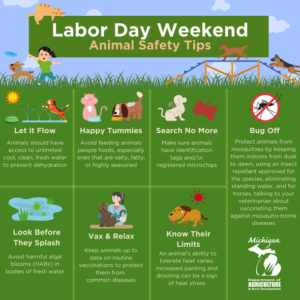
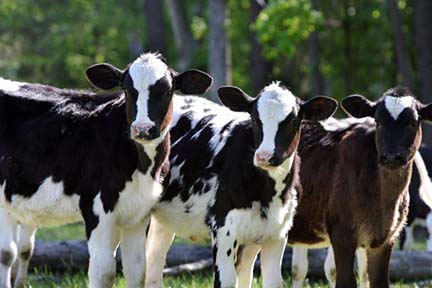
|
|
| Hi there,
I want to talk to you about a new bipartisan bill I’ve introduced to address the ongoing outbreak of avian flu in dairy cattle, which includes detections here in Michigan. It’s called the Avian Influenza and Research and Response Act and it would ensure farmers are prepared and protected as we combat avian flu. I’ve heard directly from Michigan farmers on the forefront of this outbreak about how it has been disrupting their operations and threatening their livelihoods, and this legislation is drawn directly from those conversations. The Avian Influenza and Research and Response Act would:
Food security is national security, so it’s critical that we take action to protect dairy cattle, ensure the integrity of our milk supply, and support our farmers. As we continue to combat avian flu, I’ll be working closely with state, local, and federal officials to mitigate the effects of its spread. – Rep. Elissa Slotkin |
|

 |
| For immediate release: July 02, 2024 MDARD contact: Chelsea Lewis-Parisio, 517-331-1151 Fun in the Sun and Food Safety: Take Steps to Prevent a Food Disaster this Independence DayLansing, MI—With the 4th of July right around the corner, many Michiganders are preparing to celebrate with picnics and barbecues. However, improper handling of your food can spoil the fun for you and your loved ones. According to the Centers for Disease Control and Prevention (CDC), 1 in 6 Americans suffer from foodborne illnesses each year. The Michigan Department of Agriculture and Rural Development (MDARD) urges Michiganders to practice safe food handling while having fun in the sun during the holiday weekend and beyond. Following these simple tips will keep your outdoor eating fun and safe:
If you suspect you’ve eaten spoiled food or a contracted foodborne illness, please seek immediate medical attention and contact your local health department as soon as possible for assistance. Being able to enjoy your 4th of July starts with safe food practices. For more information about food safety, visit www.foodsafety.gov. |